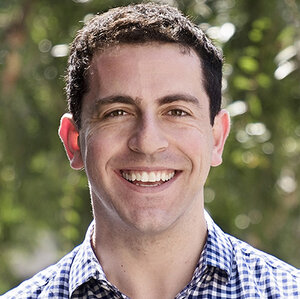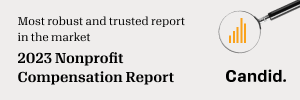Amit Paley, CEO and Executive Director, Trevor Project: Expanding LGBTQ crisis services internationally
April 7, 2022
Amit Paley is the CEO and executive director of the Trevor Project, the world’s largest suicide prevention and crisis intervention organization for LGBTQ young people. Before diving into the world of philanthropy, Paley was an associate partner at McKinsey & Company, where he led the global consulting firm’s LGBTQ group and spearheaded its efforts on inclusion for transgender and nonbinary people. Before his work at McKinsey, Paley was a reporter at the Washington Post, where he covered numerous beats, including as a foreign correspondent based in the paper’s Baghdad bureau. His coverage earned him a nomination for a Pulitzer Prize.
Paley began his work with the Trevor Project as a counselor on the 24/7 TrevorLifeline in 2011, where he continues to take calls. Paley is the first volunteer in the organization’s history to become CEO and has served in the position since 2017. Under his leadership, the organization has built and launched an integrated crisis services platform, expanded its chat and text services to 24/7, and more than quadrupled the number of youth served each month.
Earlier this year, the Trevor Project announced plans to launch its crisis services in Mexico. PND asked Paley about his expectations for the international expansion and what it means for the organization in the long run.
Philanthropy News Digest: As a former counselor, what do you think is the most important trait to look for in the first crop of volunteers in Mexico?
Amit Paley: While the geography will be different, the goal will be the same: The Trevor Project’s crisis services volunteers are trained to support LGBTQ young people who reach out to us when they are feeling suicidal or need a safe, non-judgmental place to talk. Outside of being passionate about our mission to end LGBTQ youth suicide, we look for volunteers who embody empathy and understanding and are committed to this life-saving work.
For the last 10 years, I have been a crisis counselor for TrevorLifeline, which has kept me grounded and centered on our mission, even as Trevor continues to grow and expand. This is a pivotal moment for our organization, and the first group of counselors that we train in Mexico will play a crucial role in helping establish Trevor as a trusted resource for LGBTQ youth around the world.
This is a pivotal moment for our organization, and the first group of counselors that we train in Mexico will play a crucial role in helping establish Trevor as a trusted resource for LGBTQ youth around the world.
PND: Under your leadership, the organization has expanded and transformed TrevorSpace, its social media platform. Would the digital service expansion in Mexico include TrevorSpace and what challenges does navigating a social media presence in a different country and culture bring?
AP: One of the greatest benefits of being an affirming online platform is that TrevorSpace is already an international community for LGBTQ young people. TrevorSpace has a number of users in Mexico, and its development will continue as we launch our crisis services in Mexico.
PND: The Trevor Project is regarded as the world’s largest suicide prevention and crisis intervention organization for LGBTQ youth. In the move to expand internationally, what is the organization modeling off of or working from? Can we expect this to be a model that will be used in other countries for future expansions, or is it dependent on the region?
AP: Over the years, we have honed our approaches to serving LGBTQ young people in crisis in the U.S., and we are eager to use the lessons we’ve learned here with communities in Mexico. We are also conducting research specific to Mexico to identify the needs of LGBTQ youth across the country and determine where our services can best be applied in tandem with peer organizations that already exist in Mexico.
The well-being of LGBTQ youth is key to the success of our crisis services anywhere. While we’ll continue to use our previous growth model to guide our future expansion, we expect localization to be ongoing so that our efforts are continually aligned with what we learn on the ground. We see the opportunity to place our services in the hands of LGBTQ young people around the world as one of the most exciting milestones in Trevor’s history.
PND: How does the organization plan to pay for the expansion, and what should potential donors know?
AP: For the first phase of our expansion, we are equipped with the necessary resources to launch our services internationally, thanks to the incredible support of our donors, corporate partners, and community members. As our needs continue to grow, our development team will be fundraising from U.S.-based donors, which is consistent with how many nonprofits based in the U.S. traditionally raise resources for their international work. Down the line, we expect to make assessments and explore how fundraising efforts can take place both in Mexico, as well as with other international donors who have an interest in Mexico.
PND: How and why was Mexico chosen as the inaugural international location? What laws or statistics made the region stand out as an area in which to provide aid and develop as an organization?
In Mexico, we have the opportunity to reach an estimated 745,000 LGBTQ young people ages 13 to 24 who are in crisis....
AP: To identify the first country outside the U.S. to launch our digital crisis services, we took on a robust research phase and a rigorous evaluation process, assessing a number of factors including the laws impacting local LGBTQ communities, the need for LGBTQ youth mental health support, operational feasibility, regulatory risk, human resources, and more. Based on this extensive process, we selected Mexico, and we know that the process of adapting our model for a new country will provide us with learnings that will support our future expansion into other global hubs. In Mexico, we have the opportunity to reach an estimated 745,000 LGBTQ young people ages 13 to 24 who are in crisis, a figure that is a rough approximation, due to a severe lack of data collection and research.
PND: Will the Trevor Project work alongside Mexico-based organizations for access to assistance on the ground?
AP: We are excited to partner and work closely with the leading LGBTQ and mental health organizations to improve the lives of Mexico-based LGBTQ youth, including those that aspire to or already have a footprint on LGBTQ experiences in Mexico. We are also exploring connections with organizations that deliver crisis services for other communities, such as women experiencing violence.
PND: How much has the organization expanded in the U.S. over the past five years, and what are the expectations for its development in Mexico?
AP: We have achieved remarkable growth in the past five years—steadily recruiting new talent to grow our staff from 60 people in 2017 to more than 350 people, and deepened our expertise, competencies, and capacity across each of our key program areas: crisis services, research, advocacy, public education, and peer support.
We are actively hiring for various Mexico-based roles to establish our crisis services operations including executive director, director of digital crisis services, director of recruitment, director of people operations, director of growth, and more. There is much work to be done to ensure the successful introduction of our digital crisis services for all LGBTQ youth in Mexico, and we are incredibly humbled to take this next step in supporting LGBTQ young people in Mexico and, in the future, around the world.
—Samantha Mercado






